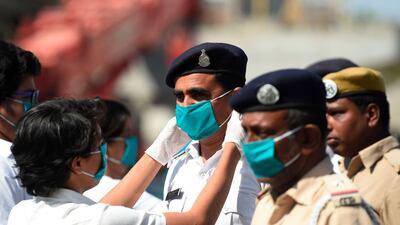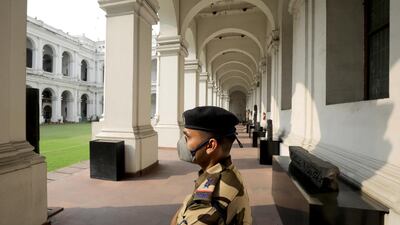Saudi Arabia’s decision to convene a special meeting of the G20 group of nations could not come at a better time as far as global attempts to meet the challenge of the coronavirus are concerned.
Arguably the most depressing feature of the pandemic is that, rather than bringing countries together to meet the biggest challenge the world has faced since the Second World War, it has set some nations against one another, with too many influential governments apparently more interested in protecting their own interests than pooling their resources for the common good.
An emergency G20 summit is therefore vital if some world leaders are to be persuaded to stop indulging in their self-defeating blame game and, instead, work together to defeat the virus and help each other to overcome the very significant challenges the pandemic poses, both to the well-being of their respective citizens as well as the well-being of the global economy.
Announcing that Saudi Arabia is to hold a virtual meeting of leaders from the world's largest economies next week, the Kingdom said it aimed to "put forward a co-ordinated set of policies to protect people and safeguard the global economy".
The summit will be a unique event; rather than meeting to face-to-face, it will be conducted by video link, thereby respecting the prevailing medical advice in favour of social distancing and isolation to prevent the virus from spreading further. By far the most important issue the meeting needs to address is the unseemly bickering that has broken out between some world leaders over who is to blame for the outbreak, as well as disputes over which countries are best prepared to deal with the virus.
At a time when international co-operation should be at the heart of the battle to defeat the pandemic, the opposite appears to be the case among some of the strongest nations of the world.
China set the tone at the start of the crisis when it initially refused assistance from the World Health Organisation to deal with the virus and, instead, pursued its own, unilateral measures to contain the outbreak, including the wholesale lockdown of entire cities. Since then we have seen the Trump administration adopt a similarly isolationist approach, not least when Washington announced that it was imposing an immediate travel ban on Europe without even bothering to observe the basic courtesy of discussing the decision with America’s so-called allies in Europe.
Moreover, US President Donald Trump’s insistence on constantly tweeting about what he calls “the Chinese virus” has provoked a fierce response from Beijing, with senior Chinese officials claiming that the virus originated in the US, and not China, and that Washington owes China “an explanation".
According to Zhao Lijian, the deputy minister of China’s Foreign Ministry Department, the US Army may have brought the disease to China last October when American troops visited the Chinese city of Wuhan, where the outbreak originated at the end of last year.
The row has escalated to the point where China has expelled a number of American journalists from the country, raising fears that the tit-for-tat recriminations between Washington and Beijing could provoke a new trade war between the two countries, with all the implications that might have for the world’s battered economy.
Then there are the deep divisions that have emerged in Europe over how best to respond to the pandemic.
Having been slow to respond to the initial outbreak, the European Union is seeking to impose its own restrictions on non-EU citizens entering the bloc. The more worrying concern for Brussels, though, is the deepening divisions among member states as European leaders appear more interested in protecting their national interests rather than those of Europe as a whole.
Perhaps the most egregious example of the fall-out among rival EU states was when the German government denied a request from neighbouring Italy to supply much-needed medical equipment, such as face masks and ventilators. In addition other EU states, such as Austria and the Czech Republic, responded to the extensive coronavirus outbreak in Italy by closing their borders to their Italian neighbours, a clear breach of the EU’s rules that allow for free movement of all citizens of the union between member states.
Add to this the self-centred approach being adopted to the pandemic by other leading countries, and it is clear that the G20 summit has a number of notable challenges to overcome if it is to succeed in securing a more co-ordinated global response to the crisis.
Certainly, the top priority at next week’s gathering must be to persuade world leaders to formulate an agreed international formula on how to defeat the virus, which can only be achieved by sharing knowledge and resources. For example the two countries that have so far been most effective at controlling the spread of Covid-19 are South Korea and Singapore, which have succeeded in limiting its spread by a combination of widespread testing, isolation of each individual infected and using mobile phone data to track those who might be at risk.
The implementation of such measures in Europe, which has now become the epicentre of the outbreak, could have a similar beneficial impact.
There is a pressing need for the world’s leading nations to work more closely together on producing the equipment needed to deal with the pandemic, such as ventilators. Global co-operation is also essential in finding an effective vaccine against the virus.
One of the major concerns of health officials is that, once the outbreak has been dealt with, the world will be hit by further pandemics if there is no vaccine that acts against the virus.
The novel coronavirus has demonstrated that it does not respect borders or nations, so the only way to end the pandemic is for world leaders to pool their resources and work together, rather than indulging in pointless bickering.
Con Coughlin is the Telegraph’s defence and foreign affairs editor

























